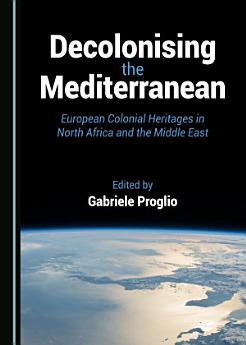Decolonising the Mediterranean: European Colonial Heritages in North Africa and the Middle East
Gabriele Proglio
2017. g. marts · Cambridge Scholars Publishing
E-grāmata
125
Lappuses
family_home
Piemērota
info
reportAtsauksmes un vērtējumi nav pārbaudīti. Uzzināt vairāk
Par šo e-grāmatu
Decolonising the Mediterranean means, first and foremost, investigating how the legacy of colonial rule over bodies and land has been used by other entities and powers to impose new forms of hegemony after the fall of empires and European powers. It means denouncing and dissecting the tools employed in the production of new geometries of power in the global Mediterranean, as well as in the farthest, most recondite corners of the Mediterranean World. Decolonising the Mediterranean is an epistemological practice of border dismantling and scrutiny of the ways in which powers overlap and intertwine. The multiplication of the border is investigated in this volume from an in-between position, namely a specific positionality of subjectivities, in order to connect the global and local, and address Mediterranean issues with a transnational approach. Decolonising the Mediterranean means thinking of the Mediterranean as a space of investigation beyond its geographical boundaries. Finally, it requires deconstructing the power relations at play, viewing the Mediterranean as an excess space of signification in order to reconsider the past and present stories and subjectivities erased by Eurocentric, nationalist historical discourse. In this sense, the Mediterranean may, then, be more than a “method”: a matter of politics, or a space without borders where the future can be reinvented from the bottom up.
This volume is structured into six chapters, each written by a different author focusing on a single North African, Maghreb and Mashrek country’s colonial legacy to investigate borders in a transnational perspective. While the research directions and topics of investigation adopted here are different, they can all be situated on the boundary line described above, and each chapter suggests a specific path for decolonising knowledge.
Par autoru
Gabriele Proglio is Assistant Professor in History of the Mediterranean and History of the Arab World at the University of Tunis “El Manar”, Tunisia, and Research Fellow in the Department of History and Civilization at the European University Institute, Italy. His publications include Border Lampedusa. Subjectivity, visibility and memory in stories of sea and land (2017), Libia 1911–12. Immaginari coloniali e italianità (2016); and Memorie oltre confine. La letteratura postcoloniale italiana in prospettiva storica (2013) among others.
Novērtējiet šo e-grāmatu
Izsakiet savu viedokli!
Informācija lasīšanai
Viedtālruņi un planšetdatori
Instalējiet lietotni Google Play grāmatas Android ierīcēm un iPad planšetdatoriem/iPhone tālruņiem. Lietotne tiks automātiski sinhronizēta ar jūsu kontu un ļaus lasīt saturu tiešsaistē vai bezsaistē neatkarīgi no jūsu atrašanās vietas.
Klēpjdatori un galddatori
Varat klausīties pakalpojumā Google Play iegādātās audiogrāmatas, izmantojot datora tīmekļa pārlūkprogrammu.
E-lasītāji un citas ierīces
Lai lasītu grāmatas tādās elektroniskās tintes ierīcēs kā Kobo e-lasītāji, nepieciešams lejupielādēt failu un pārsūtīt to uz savu ierīci. Izpildiet palīdzības centrā sniegtos detalizētos norādījumus, lai pārsūtītu failus uz atbalstītiem e-lasītājiem.






